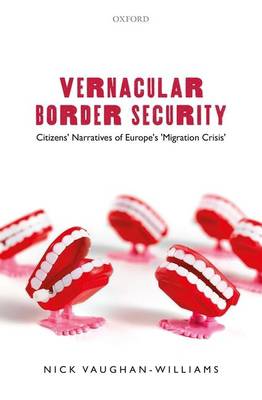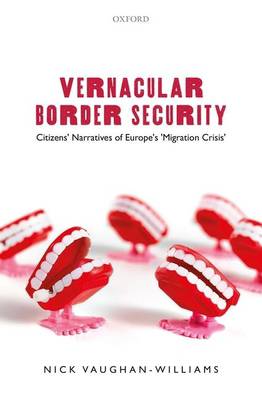
Je cadeautjes zeker op tijd in huis hebben voor de feestdagen? Kom langs in onze winkels en vind het perfecte geschenk!
- Afhalen na 1 uur in een winkel met voorraad
- Gratis thuislevering in België vanaf € 30
- Ruim aanbod met 7 miljoen producten
Je cadeautjes zeker op tijd in huis hebben voor de feestdagen? Kom langs in onze winkels en vind het perfecte geschenk!
- Afhalen na 1 uur in een winkel met voorraad
- Gratis thuislevering in België vanaf € 30
- Ruim aanbod met 7 miljoen producten
Zoeken
Vernacular Border Security
Citizens' Narratives of Europe's 'Migration Crisis'
Nick Vaughan-Williams
Hardcover | Engels
€ 185,45
+ 370 punten
Uitvoering
Omschrijving
Since the peak of Europe's so-called 2015 'migration crisis', the dominant governmental response has been to turn to deterrent border security across the Mediterranean and construct border walls throughout the EU. During the same timeframe, EU citizens are widely represented - by politicians, by media sources, and by opinion polls - as fearing a loss of control over national and EU borders. Despite the intensification of EU border security with visibly violent effects, EU citizens are portrayed as 'threatened majorities'. These dynamics beg the question: Why is it that tougher deterrent border security and walling appear to have heightened rather than diminished border anxieties among EU citizens? While the populist mantra of 'taking back control' purports to speak on behalf of EU citizens, little is known about how diverse EU citizens conceptualize, understand, and talk about the so-called 'crisis'. Yet, if social and cultural meanings of 'migration' and 'border security' are constructed intersubjectively and contested politically (Weldes et al. 1999), then EU citizens --as well as governmental elites and people on the move-- are significant in shaping dominant framings of and responses to the 'crisis'. This book argues that, in order to address the overarching puzzle, a conceptual and methodological shift is required in the way that border security is understood: a new approach is urgently required that complements 'top-down' analyses of elite governmental practices with 'bottom-up' vernacular studies of how those practices are both reproduced and contested in everyday life.
Specificaties
Betrokkenen
- Auteur(s):
- Uitgeverij:
Inhoud
- Aantal bladzijden:
- 252
- Taal:
- Engels
Eigenschappen
- Productcode (EAN):
- 9780198855538
- Verschijningsdatum:
- 1/08/2021
- Uitvoering:
- Hardcover
- Formaat:
- Genaaid
- Afmetingen:
- 162 mm x 237 mm
- Gewicht:
- 503 g

Alleen bij Standaard Boekhandel
+ 370 punten op je klantenkaart van Standaard Boekhandel
Beoordelingen
We publiceren alleen reviews die voldoen aan de voorwaarden voor reviews. Bekijk onze voorwaarden voor reviews.









